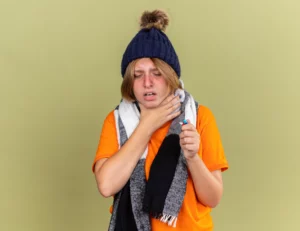Table of Contents
ToggleOverview
Most of us must have heard the myths about eye twitching at least once. Typically, eye twitching is harmless as it is an involuntary movement of eyelid muscles experienced by most people occasionally. However, it can rarely be a sign of an underlying neurological condition called stroke. Otherwise, it indicates a problem with the eye muscles’ face in controlling eyelid movements. Two eye muscles work in coordination, where one muscle closes the eyelid while the other one opens it. The causes can be varied, including stress, dry eye, caffeine, fatigue, or smoking. Please keep reading to explore the causes, signs, and symptoms of eye twitching and how it associates with stroke.
Is Eye Twitching a Sign of a Stroke?
It is scarce, but it can be a symptom of stroke or mini-stroke called transient ischemic attack (TIA) that lasts only a few minutes. A stroke, on the other hand, lasts from minutes to even hours. In the case of a stroke, the blood supply to a part of the brain disrupts, and due to the unavailability of the oxygen and nutrients that blood carries to the brain, cells start dying within minutes. Death of brain cells causes damage to the coordination and movement network, which is controlled by the brain, and as a result, eye muscles also don’t work the way they should, as controlled movements are lost, and twitching occurs. Stroke can lead to severe complications like disability, brain damage, and even death.
Transient Ischemic Attack, also known as TIA or mini-stroke, happens when the blockage of the blood supply is temporary, unlike a lasting blockage in a stroke. It is a warning that a stroke can occur in the future if the backup is not available timely. This damage happens for a few minutes, though, but it can be life-threatening. The National Stroke Association states that around 12% of TIA results in strokes.
How to Know if Your Eye Twitching is a Sign of a Stroke?
As per the Centers for Disease Control and Prevention (CDC) guidelines, if you experience any of the following symptoms, immediate medical attention should be sought:
- Blurred vision
- Difficulty in understanding speech and speaking
- Loss of vision in one or both eyes
- Weakness in one side of the face or numbness
- Numbness in arms or legs on one side of the body
- Loss of balance and dizziness
- Severe headache
Therefore, you must seek immediate medical care if you experience eye twitch and any or all of these symptoms.
What are the Other Causes of Eye Twitching?
The common causes of eye twitching include:
- Increased alcohol intake
- Increased caffeine intake and poor nutrition
- Not having enough sleep
- Fatigue and eye strain from overworking
- Stress or anxiety
- Photophobia
- Dry eyes
- High or low blood pressure
- Eye trauma
- Other eye conditions like blepharitis, corneal abrasion, or uveitis
There are two common types of eye twitch:
- Benign Essential Blepharospasm, which causes persistent eye twitch driving disturbances in vision. It affects both eyes and is more common in middle-aged women.
- Nervous system disorders also cause eye twitches. Some nervous system conditions include multiple sclerosis, hemifacial spasm, Tourette syndrome, Parkinson’s disease, Bell’s palsy, and Cervical, Oromandibular, and facial dystonia.
These severe conditions can cause prolonged eye closure resulting in functional blindness; however, vision remains intact.
Why is My Right Eye Twitching?
The right eye twitch is less frequent than the left eye, and some of the triggers include poor nutrition, excess caffeine and alcohol, allergies, dry eyes, fatigue, and stress.
How to Stop Eye Twitching?
To stop eye twitching, you need first to identify the underlying cause. If you don’t experience other symptoms along with the occasional eye twitch, then most probably it is due to mild reasons which can improve by taking better care of yourself, for example, substituting alcohol and caffeine with water and hydrating fluids, reducing stress-engaging activities, reducing the use of digital devices or if that can’t be done then using anti-glare glasses, getting enough sleep, and treating dry eyes with artificial tears.
When Should I Be Worried About Eye Twitching and Headache?
If you experience any of the following symptoms, and the twitch persists for hours, then you should consult with your healthcare provider:
- Droopy eyelids
- Discharge from eyes
- Swelling and redness
- Complete or partial eyelid closure
- Eye Pain along with twitch
- Persistent eye twitching or episodes of twitching for days or weeks
Early and correct diagnosis can help in timely recovery from stroke or other severe conditions. In the case of TIA, you can avoid the risk of full-blown stroke if you take proper consultation and treatment from a professional doctor. Book your appointment today for a detailed consultation with our experienced doctors at Your Doctors Online.
FAQs About Eye Twitching Answered by Your Doctors Online
Face twitching, also called hemifacial spasm, is usually not a sign of stroke, but it can sometimes be a sign of TIA or mini-stroke. For better diagnosis, try recognizing the BE FAST symptoms for balance, eyes, face, arm, speech, and time to identify and take action.
In rare cases, it does indicate something serious happening with your nervous system, including a brain tumor; however, such cases accompany other symptoms, including blurry vision.
Pre-signs of stroke can include one-sided weakness or numbness of the body, problems with speech and understanding, difficulty in vision, loss of balance, and lack of coordination.
Yes, it can be a sign that your body is running low on water, either in dry eyes or overall body dehydration due to excess consumption of sugar, alcohol, and caffeine, as these drinks increase urination and thus dehydrate the body.
Improper electrolyte balance can frequently cause eye twitching. You can prevent this by drinking a lot of water, reducing caffeine consumption, and eating fruits rich in vitamin K, which helps restore the electrolyte balance and hydration.
Certain foods help restore nutritional and vitamin deficiencies like lack of vitamin B12, magnesium, and vitamin K that you can fix by taking diets rich in these vitamins, like eggs, salmon, chicken, beans, and avocado, along with reducing alcohol and caffeine.
High stress and anxiety can cause minor eye twitching as it indicates that the nerves around the face overstimulate due to the body being under pressure.







